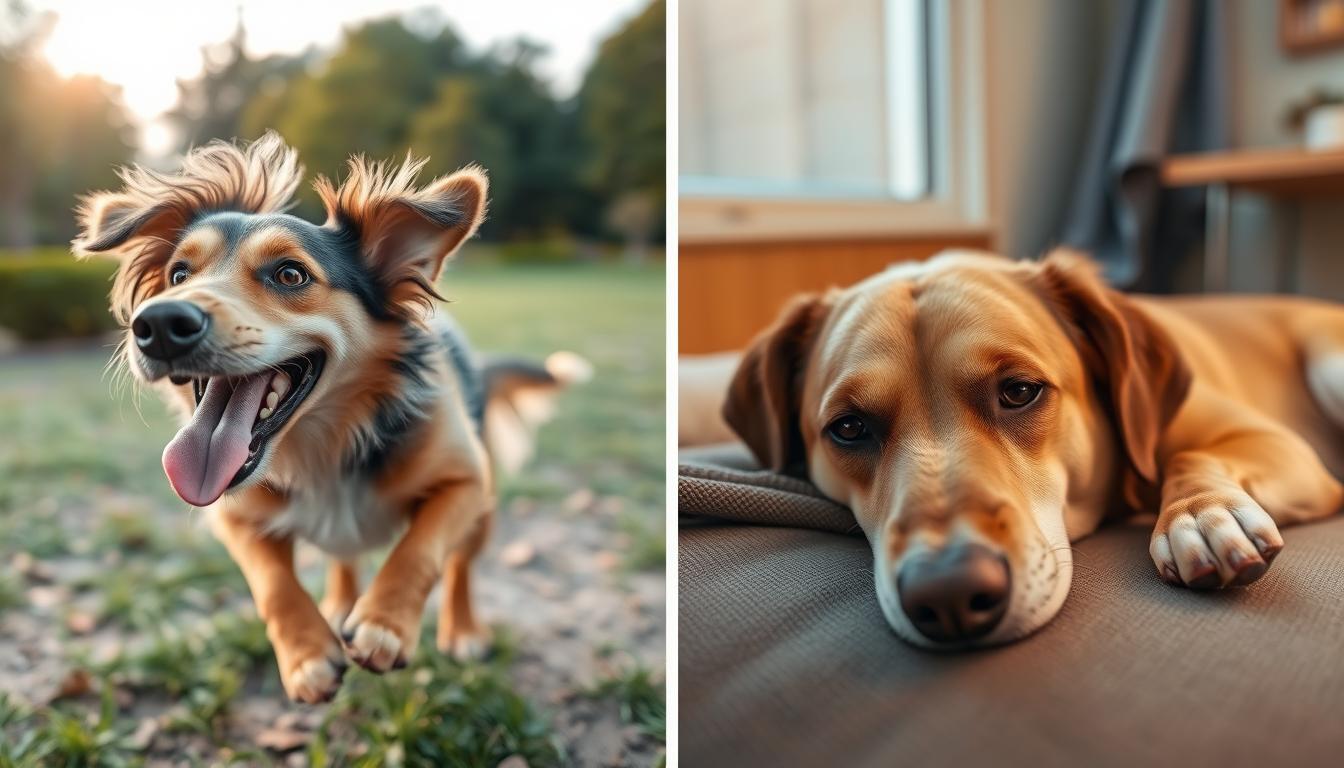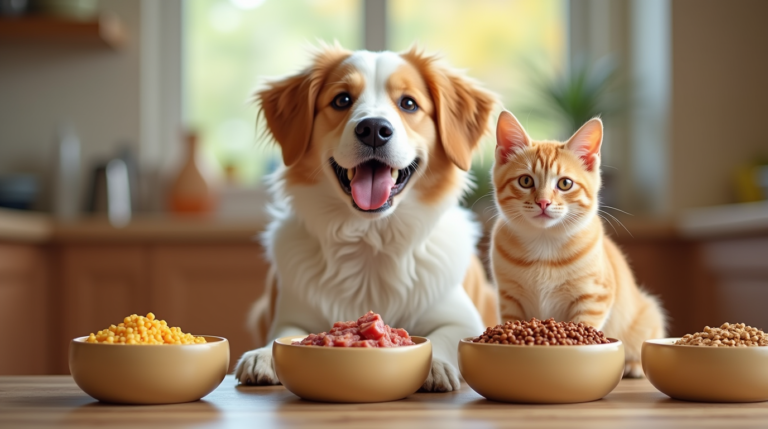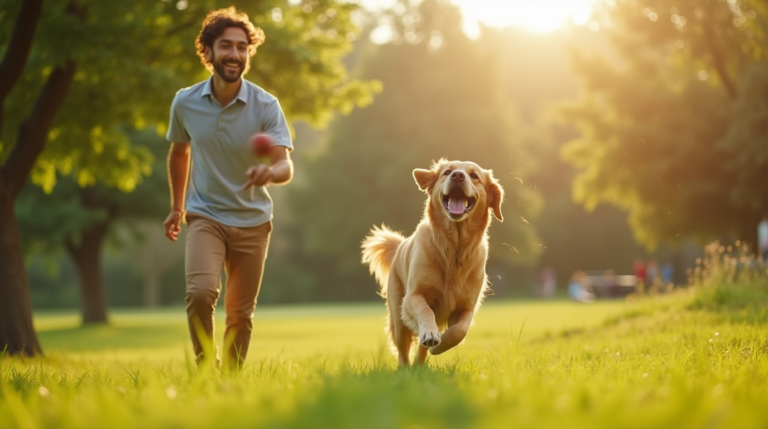As a devoted dog parent, you know how vital it is to keep your furry friend healthy. Vaccines are key in protecting them from serious diseases like rabies and parvovirus. You might notice your dog acting differently after their shots. Don’t worry, these changes are common and usually short-lived.
When your dog gets vaccinated, their body is working hard to fight off diseases. This effort can cause small changes in how they act and feel. They might seem a bit tired or uncomfortable where they got the shot. These signs are your dog’s way of adjusting to the changes in their body.
Knowing what to expect after your dog’s vaccination helps you care for them better. By understanding these changes, you can support your dog during this time. This ensures they stay healthy and recover quickly.
Table of Contents
Importance of Vaccinating Your Dog
It’s vital to keep your dog healthy by getting them vaccinated. Without vaccines, your dog could get very sick or even die from serious diseases. Even though some people worry about vaccine safety, lots of research has shown they are safe. The dangers of not vaccinating are much greater than any risks from vaccines.
Protecting Your Furry Friend from Serious Diseases
Vaccines are key to protecting your dog from deadly diseases like parvovirus, distemper, and rabies. These diseases can cause serious illness, permanent harm, or even death. Keeping your dog’s vaccinations current is a smart way to ensure their health and happiness for years to come.
Weighing the Benefits Against Potential Risks
While there are risks to not vaccinating dogs, the benefits of vaccinating them are much greater. Serious side effects from vaccines are very rare. The importance of dog vaccinations is huge in keeping your pet safe from serious diseases.
| Vaccine-Preventable Diseases | Potential Consequences | Benefits of Vaccination |
|---|---|---|
| Parvovirus | Severe gastrointestinal illness, dehydration, and potential death | Effective protection against a highly contagious and potentially fatal virus |
| Distemper | Respiratory, gastrointestinal, and neurological problems leading to permanent disabilities or death | Safeguarding your dog from a devastating disease with no cure |
| Rabies | Fatal viral infection of the nervous system, transmissible to humans | Mandatory vaccination required by law to protect both dogs and people |
“Keeping your dog’s vaccinations up-to-date is one of the most important things you can do to ensure their long-term health and well-being.”
Common Behavioral Changes After Vaccinations
When your dog gets their vaccinations, they might act differently for a while. This change is because of their body’s immune response and the soreness from the shot.
Lethargy and Fatigue
Dogs often feel tired after getting shots. Their body uses energy to fight off diseases. So, they might seem more sleepy and less active for a bit.
Decreased Appetite
Some dogs might not want to eat as much after shots. This is normal and usually goes back to normal in a couple of days. The soreness or a slight fever can make them less hungry.
Mild Discomfort at the Injection Site
Your dog might feel a bit sore where they got the shot. This is common and should get better in a few days. You can help them feel better by gently touching the area or giving them treats.
These changes might worry you, but they’re usually short-lived and different for each dog. If your dog’s behavior changes are mild and they seem okay, there’s no need to panic. But if things get worse or last too long, talk to your vet.
Why Do Behavior Changes Happen?
Dogs often show mild behavioral changes after getting vaccinated. These changes can be due to a few reasons. They might be sensitive to the vaccine or have an allergic reaction to it.
Individual Sensitivity to Vaccines
Puppies are more likely to show behavior changes after a vaccine. This is because their immune systems are still growing. They react more to the vaccine, leading to noticeable changes.
Vaccine Components and Potential Allergies
Some dogs might have an allergic reaction to vaccine parts. This can cause serious symptoms like vomiting, diarrhea, or trouble breathing. If your dog shows these signs, get them to the vet right away.
Most dogs will feel better within a day or two after getting vaccinated. They might seem tired, eat less, or be sore where they got the shot. But, if their behavior gets worse or lasts too long, they need to see a vet.
“Experiencing vaccine side effects or reactions should not deter from continuing vaccination, as vaccines are imperative in preventing severe and deadly diseases.”
Stress and Anxiety During Veterinary Visits
Many dogs feel stressed and anxious when they go to the vet, especially for vaccinations. The new place, strangers, and fear of pain can make them act differently. This can cause them to be less active or less interested in things around them.
Signs of anxiety in dogs include trembling, panting, or hiding. They might seem tired or not care about their usual activities. This is because they’re stressed about the vet visit.
To ease your dog’s stress at the vet, try these tips:
- Give them gentle reassurance and positive reinforcement. Use soft words and give treats for calm behavior.
- Take them to the vet before the actual visit. This lets them get used to the place.
- Bring their favorite toys or comfort items to the vet. It makes them feel better.
- Ask the vet about calming supplements or pheromone products. They might help your dog relax.
By helping your dog feel less stressed at the vet, you can make the visit better for both of you. It helps them behave normally and enjoy the time together.

| Behavior Change | Potential Cause | Recommendation |
|---|---|---|
| Trembling, Panting, Hiding | Anxiety and Stress | Provide Gentle Reassurance, Use Calming Supplements |
| Lethargy, Decreased Activity | Unfamiliar Environment, Anticipation of Discomfort | Bring Comfort Items, Schedule Pre-Visit |
| Disinterest in Surroundings | Heightened Stress Response | Positive Reinforcement, Calming Pheromones |
“Addressing your dog’s stress and anxiety during veterinary visits can help ensure a more positive experience for both you and your furry companion.”
dog behavior change after vaccination
As a responsible pet owner, it’s key to know about the possible behavioral changes in your dog after shots. These changes are usually short-term and can differ from dog to dog. Knowing what to expect can help you support your pet better.
Most dogs react mildly to vaccines. They might feel tired, have bumps at the shot site, or sneeze. But, serious reactions like anaphylaxis are rare and happen quickly after the shot or up to 48 hours later.
Stress from vet visits, including shots, can also cause temporary mood swings in dogs. Smaller dogs might be more at risk if they get too many shots at once. It’s best to space out their vaccinations to lower the risk.
- Vaccines protect dogs from serious and deadly diseases.
- Some dogs might feel tired or weak after shots as their body fights off the vaccine.
- Shots can make dogs less interested in food right after, as their body focuses on the vaccine.
- Dogs might feel a bit sore or uncomfortable where they got the shot, but this usually goes away in a few days.
Dogs react differently to vaccines, with some showing more mood changes than others. In rare cases, dogs can have allergic reactions to vaccine parts, leading to bigger mood swings.
If your dog shows severe or lasting mood changes after a shot, or if you see signs of an allergic reaction, see a vet. They can figure out what’s going on and make sure your dog is okay.
“Vaccinations are crucial for our dogs’ health, but it’s vital to watch for possible mood changes. By understanding and keeping an eye on your dog’s reaction, you can help them get through it and stay healthy.”
Monitoring Your Dog’s Well-Being
Most dogs act differently after getting shots, and it usually goes back to normal in a few days. But, some changes might need a vet’s help. It’s key to watch your dog closely and know when to get help.
When to Seek Veterinary Care
If your dog’s behavior changes a lot or lasts too long after shots, call your vet. This could mean they’re having a bad reaction or something else is wrong. If your dog shows signs of an allergic reaction, like big swelling, trouble breathing, or throwing up, get help right away.
Severe or Prolonged Behavior Changes
- Lethargy or fatigue lasting more than 48 hours
- Persistent decrease in appetite beyond a day or two
- Prolonged discomfort or tenderness at the injection site
- Unusual or uncharacteristic behavior changes
Act fast if your dog shows signs that worry you or are different from usual. Your vet can figure out what’s wrong and fix it. This way, your dog stays safe and happy.
“The health and safety of your dog should always be the top priority when it comes to vaccinations. If you have any doubts or concerns, don’t hesitate to reach out to your veterinarian.”
Allergic Reactions to Vaccinations
Vaccination is key to keeping your dog safe. But, it’s important to know about allergic reactions. These are rare but can be serious and need quick vet care. Knowing the signs of a vaccine allergy can help protect your dog.
A study in the Journal of the American Veterinary Medical Association found one in 250 dogs react to vaccines. This means 13 reactions for every 10,000 doses. Small, young, neutered male dogs are most at risk, but the risk goes down as they get bigger.
The common signs of vaccine allergy in dogs are swelling, trouble breathing, and vomiting. If your dog shows these dog allergic reactions to vaccines, call your vet fast. Quick action is key to keeping your dog safe.
Severe dog vaccine reactions are rare but can be deadly. Being watchful and knowing about allergic reactions helps keep your dog healthy after shots. Watch the injection site for swelling and call your vet if you’re worried.
“Understanding how to care for a dog post-vaccination can help minimize discomfort and effectively monitor for adverse reactions.”
Your vet is the best person to talk to about your dog’s shots. They can help manage your dog’s vaccination schedule and answer any questions. Working with your vet ensures your dog stays safe and healthy during vaccinations.
Uncharacteristic Behavior After Vaccinations
After getting vaccinated, dogs might act differently. They might seem tired, eat less, or show mild pain where they got the shot. But, some dogs can act very differently than usual. If your dog is acting out of character, it’s best to talk to your vet.
Behavior changes after shots can mean there’s a health issue. For example, if your dog gets too aggressive or anxious, it might be a reaction to the vaccine. Or, if your puppy is always hyper, it could be a sign of something serious.
Every dog is different, and how they react to vaccines can vary. Some dogs might show big changes after getting shots. Your vet can figure out if the shots are causing the problem or if there’s something else going on.
If your dog is acting strangely after shots, call your vet right away. Quick action can keep your dog safe and find out if there’s a problem.

At Five Oaks Animal Hospital, we care about keeping your dog safe and healthy. We offer vaccination packages to protect them. You can even pay monthly for easier payments. Contact us to find the best vaccination plan for your dog.
Deciding on Vaccinations for Your Dog
When thinking about vaccinating your dog, it’s key to think about their health and lifestyle. Your vet can look at your dog’s needs and suggest the right vaccination plan. Talking about any concerns you have can help you make the best choice for your dog.
Assessing Your Dog’s Health and Lifestyle
Your vet will consider your dog’s age, breed, and health when suggesting vaccinations. Dogs with certain lifestyles, like those that meet many other dogs, might need more shots. Your vet can help balance the benefits of protection with the risks of side effects.
Discussing Concerns with Your Veterinarian
If you’re worried about vaccinations, talk to your vet. They can explain the low chance of serious side effects and why vaccines are important. Together, you can choose the best option for your dog’s health.
FAQ
What kind of behavioral changes can I expect in my dog after vaccinations?
Why do these behavioral changes happen?
When should I be concerned about my dog’s behavior after vaccinations?
How can I help my dog feel more comfortable during veterinary visits?
What should I do if I have concerns about the safety of dog vaccinations?
Source Links
- Ruckersville Animal Hospital – https://www.rvilleah.com/site/blog/2023/11/21/vaccine-reactions-dogs
- Dog Vaccinations: Side Effects – Dogs First – https://dogsfirst.ie/dog-vaccinations-side-effects/
- Is A Dog Vaccine Lump Normal? – Loveland Regional Animal Hospital – https://lovelandregional.com/dog-vaccine-lump/
- Anti-Rabies Vaccine: Does It Really Change Your Dog’s Behavior? – Veterinary Secrets with Dr. Andrew Jones, DVM – https://veterinarysecrets.com/anti-rabies-vaccine-does-it-really-change-your-dogs-behavior/
- Five Oaks Animal Hospital – https://www.fiveoaksah.com/site/blog/2024/04/15/dog-behavior-change-after-vaccination
- Advanced Care Veterinary Hospital – https://www.advancedcarevet.com/site/blog/2024/02/15/dog-behavior-change-vaccination
- Lafayette Companion Animal Hospital – https://www.lafayettepetvet.com/site/blog/2024/04/15/dog-behavior-change-after-vaccination
- Pet Vet Battlewood – https://www.petvet.vet/site/blog/2024/05/30/dog-behavior-changes-after-vaccination
- Crossroads Veterinary Hospital – https://www.crossroadsvh.com/site/blog/2024/05/15/dog-vaccination-behavior-changes
- Dog Behavior Change After Vaccination – Whole Dog Journal – https://www.whole-dog-journal.com/behavior/dog-behavior-change-after-vaccination/
- Bruceville Pet Hospital – https://www.brucevilleph.com/site/blog/2024/06/15/dog-behavior-changes-after-vaccination
- Animal Health Clinic – https://www.animalhealthvet.com/site/blog/2024/03/15/dog-behavior-change-after-vaccination
- South Novato Animal Hospital – https://www.southnovatoanimalhospital.com/site/blog/2024/02/15/dog-behavior-change-after-vaccination
- Rivergate Veterinary Clinic – https://www.rivergateveterinaryclinic.com/site/blog/2023/12/31/dog-behavior-change-after-vaccination
- How to Deal with Dog Behavior Change After Vaccination – https://barkandlearnboarding.com/how-to-deal-with-dog-behavior-change-after-vaccination/
- A-Animal Clinic & Boarding Kennel – https://www.a-animalclinic.com/site/blog/2024/05/15/pet-itchy-after-vaccination
- Post-Surgery Dog Vaccination Timeline: 15 Essential Tips | Greystanes Vet – https://www.greystanesvet.com.au/post/post-surgery-dog-vaccination-timeline-15-essential-tips
- Vaccine Allergic Reactions in Dogs and Cats – https://veterinarypartner.vin.com/default.aspx?pid=19239&id=4951409
- My Dog Has a Lump After a Vaccine. Is This Normal? | Pewaukee Veterinary Service – https://pewaukeeveterinaryservice.com/blog/dog-lump-after-vaccine/
- North Cobb Animal Hospital – https://www.northcobbanimalhospital.com/site/blog/2024/02/15/dog-behavior-change-vaccination
- Rabun Animal Hospital – https://www.rabunanimalhospital.com/site/blog/2024/07/15/dog-behavior-changes-after-vaccination
- Frontier Veterinary Hospital – https://www.frontierpet.com/site/blog/2024/01/15/dog-behavior-change-after-vaccination
- Did your cat change after vaccinations? | Expert Insights – https://www.thecatbehaviorclinic.com/does-cat-behavior-change-after-vaccinations/








1 thought on “How dog behavior change after vaccination: What to expect.”
Comments are closed.